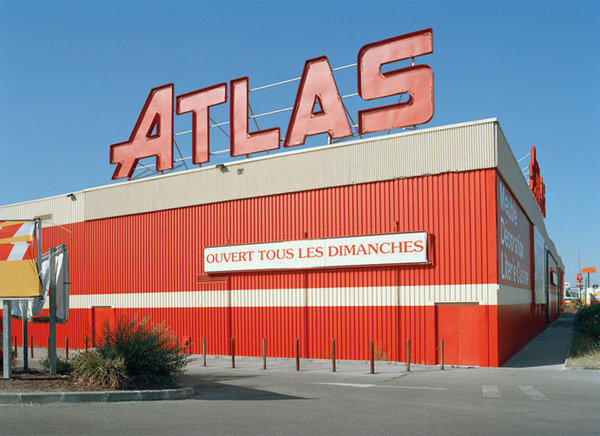Atlas
dal 9/10/2012 al 10/11/2012
Segnalato da
Philippe Chancel
Ezio D'agostino
Olivier Cablat
Hannah Darabi
Aymeric Fouquez
Taiji Matsue
Domingo Milella
Josef Schulz
Eric Tabuchi
9/10/2012
Atlas
Lucie Weill & Seligmann, Paris
This exhibition gathers nine contemporary photographers around landscape as a theme and a topic, our post-industrial societies in their infancy. Their common idea is to question our perception of landscape and to contribute to its renewal.

Atlas, the mythological Titan, is said to carry the world on his shoulders since time immemorial and forever more. His back bent under the celestial sphere, he watches the Earth and men with a panoptic eye.
Collecting typological and semiological knowledge, an atlas provides all kinds of pictoral and mapped representations, political and ideological conceptions, of a given society or a culture. The atlas expresses a point of view, creates categories and defines territories.
This exhibition gathers nine contemporary photographers around landscape as a theme and a topic, our post-industrial societies in their infancy. Their common idea is to question our perception of landscape and to contribute to its renewal. Among the artists participating in this exhibition, some of them come from famous Art schools, such as the State Academy of Art in Düsseldorf, the National School for Photography in Arles, the National School of Fine Arts in Paris, the School of Visual Arts in New York and others are independent learners. Olivier Cablat, Ezio D’Agostino, Hannah Darabi and Domingo Milella are just starting their careers, whereas Philippe Chancel, Aymeric Fouquez, Taiji Matsue, Josef Schulz and Éric Tabuchi are internationally recognised.
Landscape is a pattern linked to the story of the photographic medium since its origin. Its reference point in the contemporary chronology is, if any, the New Topographics exhibition of William Jenkins (1975) which announced a revival of the documentary kind by introducing artists such as Stephen Shore, Lewis Baltz, Bernd and Hilla Becher, Robert Adams…
“The pictures were stripped of any artistic frills and reduced to an essentially topographic state, conveying substantial amounts of visual information but eschewing entirely the aspects of beauty, emotion and opinion,”
said Jenkins in the exhibition text. Indeed, black and white, minimal art, series, objectivity of pictures and the “lack of style” introduced a new esthetics of landscapes on photograph(ie)s to document the industrialised world of the past century. The atlas proposed in 2012 sets new rules. These German, Italian, Iranian, French and Japanese artists presented by the LWS gallery are thought of as the new wave.
These artists don’t betray the New Topographics legacy, but continue documenting the transition to a post-industrial era by using color photography each exploring the subleties of a very own palette and using the beauty of light to contrast with the man-altered landscape, focusing on signature details that tell the larger story.
From Val Camonica in Italy to Dubai in United Arab Emirates, from the cemeteries of the North of France to peri-urban areas in Camargue, from American advertising hoardings of the sixties to the back of trucks travelling all over Europe, the photographs in this exhibition give us a view of societies doomed to change(s), sometimes brutal and decisive, sometimes slow, on the decline or pending. These artists, while continuing to produce images in the continuity of the documentary photography so called quiet, become gradually emancipated from this kind by incorporating contemporary art to their practice. By turning away from the event, the sensational and the action, they reveal the artifice. By disclosing the successive layers of human activities, they unearth the various temporalities of a given territory. They draw the line on the 2000s screen and give us the atlas of a post-industrial world gradually built on ruins. Implicitly the question regarding the identity of places and the sense of belonging to them arises. Indeed, our relationship with the landscape and our place as a viewer are questioned here. The critical views of these artists contribute to revealing, not without humor or irony, the duality of human activity as seen in its relation to landscape and nature.
If usually the construction of an atlas is given to the archaeologist, the historian or the sociologist, this new generation of artists constructs the basis of another atlas.
Valentine Guillien, Sebastian Hau, Victor Secretan
Image: Olivier Cablat, Atlas, 2011 Impression pigmentaire — 30 × 40 cm
Edition de 2 + 1AP Courtesy of the artist & Galerie LWS, Paris
Opening Wednesday, October 10th at 6 p.m.
Lws
6 rue Bonaparte - Paris
Tuesday – Saturday, 2 PM – 7 PM
Other times by appointment



